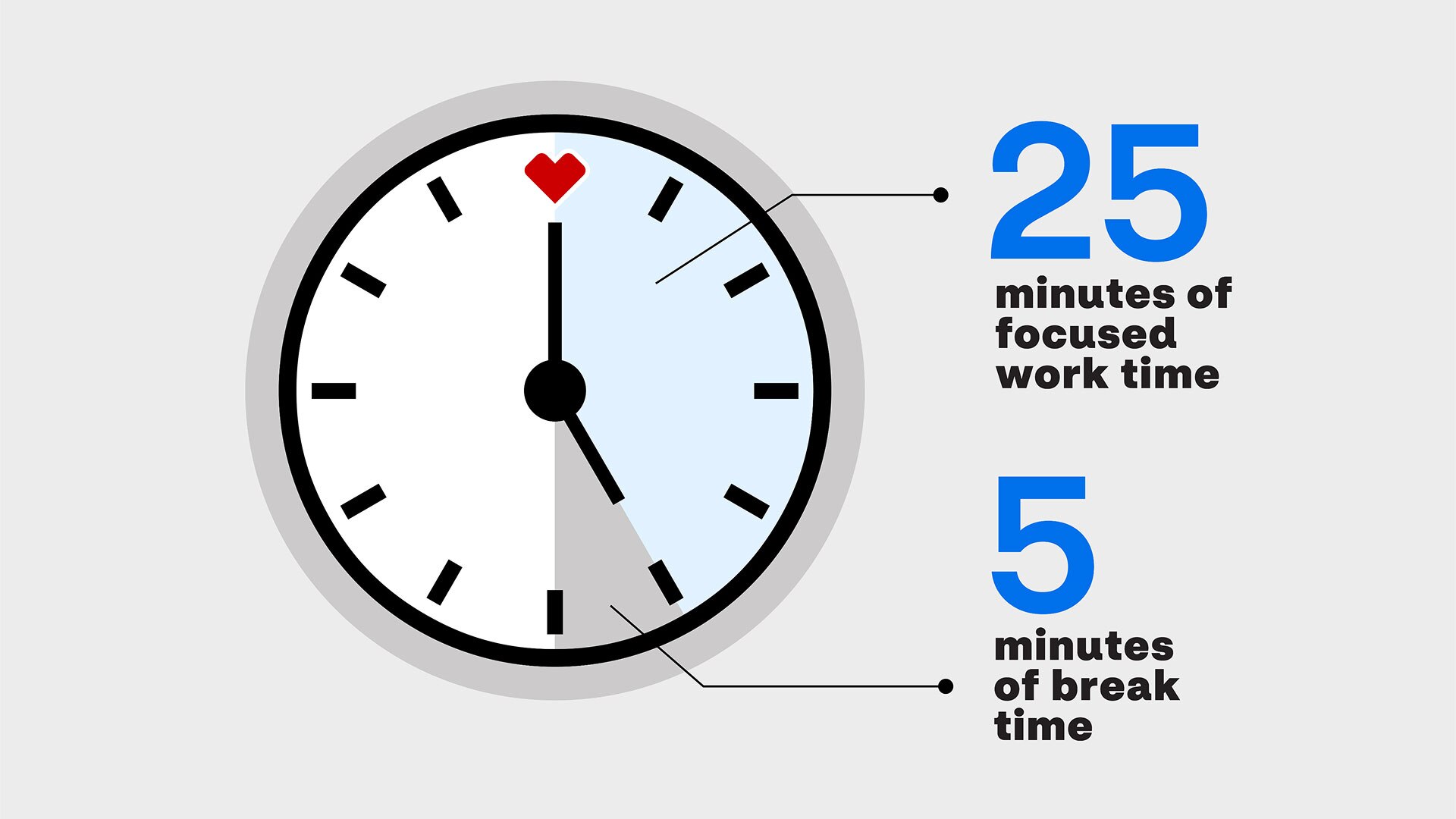Ways to help improve focus by reducing stress
Explore these science-backed tips to help stay centered, calm and on task.

In a world filled with constant stressors and endless distractions — we’re looking at you, smartphones — it can be difficult to focus. Research suggests that people spend 46.9 percent of their days with their minds wandering in different directions. This can lead to a detrimental feedback loop: If someone is anxious over a lack of productivity, that anxiety can make them feel even less productive.
Help break this cycle by exploring these science-backed strategies:
In this article:
Five ways to help reduce stress
Possible strategies to help improve your mental health
Decrease distractions
Multitasking can result in mental overload and make you less productive and more stressed. Instead, work on one thing at a time and take periodic breaks.
Rest up
Getting sufficient rest is key to your mental health and your heart health. To get better sleep, try using a weighted blanket, avoiding distractions like TV or phones in bed and other strategies.
Get active
Exercise or physical activity can help improve your mood and ability to deal with stress.
Meditate
Try meditation tools, such as apps or calming devices, to help reduce anxiety.
Deep breathing exercises
A proven stress reliever, deep breathing can trigger a “relaxation response.” Deep breathing may help regulate the body’s nervous system through a practice of slow, deep breaths.
Eliminate distractions
Distractions can be external — a yappy dog or the endless “ping!” of news alerts — but they can be internal, too. Either way, these distractions get in the way of focusing on the task at hand. Before sitting down to complete a focused task, concentrate on preparing the workspace. If possible, choose a quiet area where distractions will be at a minimum, turn off phone notifications and play music if it helps with concentration. Individuals can then check in with themselves to see if they’re in a mental space where they can focus and take care of their physical health. Get a drink of water or a snack if needed to be more comfortable.
Stop multitasking
Multitasking can actually cost as much as 40 percent of someone’s productive time, according to the American Psychological Association (APA). “The brain can focus on only one thing at a time, so each switch reduces performance,” says Julie Landry, PsyD, a board-certified clinical psychologist and founder of Halcyon Therapy Group in San Antonio, Texas. This can mean that it takes longer to complete things, and a multitasker will be more likely to make mistakes.
Introduce periodic breaks to help maintain efficiency and stay on task. “The Pomodoro technique — breaking a day into 25-minute productivity chunks separated by 5-minute breaks — is a great way to utilize this concept,” says Dr. Landry. Made popular by author and business consultant Francesco Cirillo, this technique was designed to help people finish tasks that might feel overwhelming.
Try the Pomodoro technique for time management
The Pomodoro technique
A time-tested method for maintaining efficiency, the Pomodoro Technique calls for 25 minute “sprints” separated by 5 minute breaks.

The theory
Concentrating for a short period of time is easier than tackling a big project all at once. Here’s how it works:
- 25 minutes of focused work time
- 5 minute break

How it works
- Select your task
- Set a 25 minute timer
- Work until the timer goes off
- Take a 5 minute break
- After 4 such sprints, take a longer break for 30 minutes

Multitasking doesn’t work
Multitasking can cost as much as 40% of your productive time. Managing your work time with regular breaks helps improve focus and efficiency.

Improve quality of sleep
A good night’s rest is important for many aspects of health — and good mental health is toward the top of the list. Still, a Centers for Disease Control and Prevention (CDC) survey in 2022 stated that roughly one-third of adults in the U.S. report not getting the recommended seven-plus hours of sleep. Research shows that sleeping just one hour less per night can have a negative impact on working memory — and just one night of poor sleep can diminish attention and alertness. This comes as no surprise to anyone who has been kept up by a crying baby and then tried to function properly the next day.
These effects may only get worse over time, and sleep disturbances may have consequences as serious as a higher risk of dementia in the long term. But there’s plenty to do to improve sleep quality. Not sure where to start? Learn more on how to get a better night's sleep, starting tonight.
Exercise more often
When we move our bodies, more blood flows to the brain. This, in turn, positively affects our ability to process information and increases development of new neural connections in the hippocampus, the center of learning and memory. “As a result, exercise can improve attention and memory, increase brain activity, cognitive function and can enhance mood and the ability to cope with stress,” says Dr. Landry.
Regular exercise has the added benefit of helping to control blood pressure and resting heart rate — both of which can be aggravated by stress. Reap the benefits of exercise to help lower blood pressure in the long term, and help with both acute and chronic stress through a variety of movements. Walking, running, cycling, yoga, yard work, dance, swimming, tennis and hiking are all great options. Be sure to speak with a health care provider before starting any new exercise regimen.
Practice meditation
Just 10 minutes of meditation may help improve focus. A 2018 study found that novice meditators who listened to a short meditation tape performed better on attention tests than the control group. One journal article noted that mindfulness-based therapy was effective for reducing two mind-wandering triggers: stress and anxiety. Mindfulness apps can help.
Try deep-breathing exercises
Deep breathing can trigger a “relaxation response.” When someone is under stress, their body can respond by increasing their heart rate and blood pressure. When they relax, their stress decreases, while their heart rate and blood pressure both lower. Deep breathing (also called “diaphragmatic breathing” or “DB”) may help regulate the body’s nervous system through a practice of slow, deep breaths.
To get started, one option is a deep-breathing assist device like the Vicks Advanced Soothing Vapors Waterless Vaporizer, but a simple breathing exercise can be done without any equipment. The U.S. Department of Veterans Affairs recommends the following relaxation exercise:
- Get into a comfortable position, sitting or lying down.
- With one hand on the chest and one hand on the belly, take a deep breath through the nose, focusing on filling the belly (not the chest) up with air.
- Exhale through the mouth, feeling the air from the belly release.
- Aim for four to six breaths per minute.
- Repeat for 10 minutes.
Consider taking supplements
Doctors agree that it’s best to get the majority of your nutrients from your diet. So before starting on any supplement regimen, consult with your health care provider to rule out interactions with other medicines you’re taking and to ensure taking a vitamin for stress is a healthy fit for you.
Having said that, supplements* such as ashwagandha, may help with stress relief and improved focus — although additional research is needed on all fronts. A 2021 study published in the Journal of Clinical Medicine, suggests that taking ashwagandha may help to counter stress effects by supporting innate and adaptive immunity. Before bedtime, help calm your mind with CVS Health Melatonin + Ashwagandha sleep and stress support capsules.
This content is for informational purposes only and is not medical advice. Consult your health care provider before taking any vitamins or supplements, and prior to beginning or changing any health care practices.
-
FOR POMODORO TECHNIQUE: Glon, C. Hugh F. MacMillan Law Library - Emory University. What is the Pomodoro Method? Published February 2021. Guides.Libraries.Emory.edu. Accessed June 13, 2025.
-
FOR MULTITASKING COSTS 40% OF PRODUCTIVE TIME: Hasan, K. National Library of Medicine. Digital multitasking and hyperactivity: unveiling the hidden costs to brain health. Published September 18, 2024. PMC. NCBI.NLM.NIH.gov. Accessed June 13, 2025.




